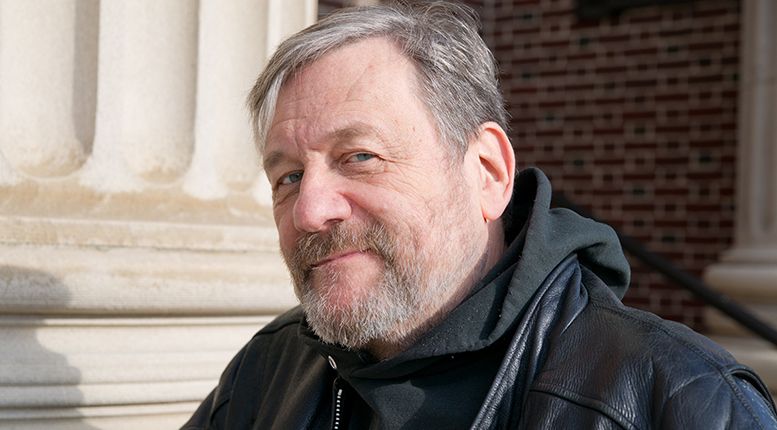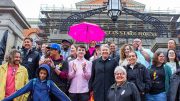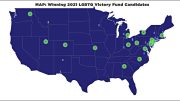By: Mike Givens/TRT Assistant Editor—
In part one of this series, The Rainbow Times explored what bisexuality is, the bigotry bisexuals face, and the double standards that exist between men and women. In this final part of the series, bisexual people speak about their identities and misconceptions around them.
Jupiter Zirkua is a vocalist for the band Stuffy Doll. Based out of Seattle, the group is self-described, as “ … a dirty glam rock band with an affinity for the peculiar, glittery, and venomous.”
Zirkua, who identifies as bisexual and genderfluid, described themselves as a, “tough-guy-goth kid” throughout their adolescence growing up in a strict Catholic household in Florida. Zirkua said that their childhood involved, “ … trying to discover exactly where I fell without letting any of the authority figures in my life catch on.”
During their formative years, Zirkua preferred the company of girls and, for the most part, avoided spending much time with male peers. Having been raised by women, they felt more comfortable around females.
When it came to boys, Zirkua preferred, “ … admiring them in close proximity.” But as they grew older, that admiration developed more substance.
“ … it wasn’t until late elementary school [and] early middle school years that I had quite the words for it,” they said. “I think the first time it fully dawned on me that I saw boys as equally viable romantic partners with girls was in 6th grade with a sweet boy who looked like a young Severus Snape and all my hormones just started ringing the cloister bells.
Zirkua is also pansexual, a term used to describe a person who is attracted to others regardless of gender identity, gender, or sex assigned at birth, and also as demisexual, meaning they must feel an intense emotional attraction to someone in order to pursue and derive pleasure from sex.
Zirkua said they present as a white male, which can often make for interesting social interactions given their goth personality and gender fluidity.
“That affords me a wealth of privilege that some of my friends don’t share,” they said. “ … society views a man’s rejection of heteronormativity as worse than a woman’s, but ultimately that doesn’t come close to overcoming the truly staggering amount of privilege I have to just be able to blend in with the heteronormative society whenever I want and, honestly, not even feel particularly uncomfortable.”
But for people like Briyana Clarel, privilege is lacking.
“Being black, queer, non-binary, and everything else that I am definitely contributes to being more marginalized than if I were only one or two of those things,” they said.
When describing their process of accepting their sexuality, Clarel used terms like, “traumatic, confusing, complicated, and stressful.”
“This heteronormative, misogynistic, anti-black, racist society has made it challenging for me to be my full self,” they said. “I have acquired a lot of emotional and mental stress and trauma from navigating childhood, adolescence, and adulthood as a queer person.”
Clarel said that they surround themselves with friends and a community of other queer and/or trans people, but still feels the burden of being an, “unidentified other.”
“This has also impacted my social interactions with friends, family, colleagues, and others,” they said. “While I have experienced emotional and mental challenges, I have not faced issues in securing housing or work, and remain connected to my family of origin, which is unfortunately not the case for many other queer and trans folks, especially those of us who are black.”
JoAnna Hardee, a bisexual black woman in the Boston area, has a more carefree attitude when it comes to her identities.
“I don’t know that they intersect anymore than any other label intersects with being either black or a woman. Unfortunately, being a black woman in general puts you at an intersection, so at this point I feel that one further label is just what it is. A label. People have their choice [to] take it or leave it.”
Having grown up in Florida, Hardee said that she was raised in a religious family and the coming out process was much easier when she moved up north.
“I didn’t come out until I was 21 and by that time, I’d moved to Boston,” she said, noting that her family and friends back in Florida have been supportive. “The community is huge here and I felt more comfortable being myself.”
Though Zirkua has certain privileges in terms of fitting in with heterosexuals and meeting societal expectations, they said their sexuality has caused conflict.
As an adolescent, Zirkua faced bullying for being too effeminate, and said they were “beaten and belittled” by male friends for their sexuality. Zirkua said that the brother of a male friend sexually assaulted them when he found out about their bisexuality.
“After that, as I made my way through high school, I started to surround myself with queers and weirdos, dated a girl through a good chunk of my time there, and got a lot of the heat taken off,” they said.
As an adult, Zirkua said that their gender fluidity often solicits stares.
“If I grow a beard, I’m still happy wearing a dress,” they said. “I’m also built in such a way that, as an adult, only the drunkest and [foolhardy] of bigots might think to engage with me physically, which is an extra layer of protection.”
Zirkua, who has a diagnosis of bipolar disorder, said they often juggle identities in relationships.
“ … most people who would have a problem with one would have a problem with the other. It’s rare for me to come across a queer ally who can’t hang with the idea of someone who’s bipolar, but it comes with a long list of extra misconceptions to sort through.”
Denarii Grace, a board member of the Bisexual Resource Center (https://biresource.org), said that her identities can’t be separated, but are interwoven.
“So, the thing is, I can’t separate my bisexuality from my other oppressed identities,” she said. “I’m a woman, a black person, a fat person, a femme person, a [person with multiple disabilities], and a poor person, in addition to being bisexual.
“So I can’t really say, ‘Well, I’ve been traditionally unemployed for over three and a half years because I’m black. I’m perpetually single because I’m fat. I’m excluded from X, Y, or Z space because I’m bi/non-monosexual/romantic.’ It’s all connected and, I’m sure, in some situations one or two identities have affected outcomes and experiences more than others.”
Harvard University Professor of Women, Gender and Sexuality Studies Michael Bronski spoke about the lived experiences of people like Grace.
“We understand that identities intersect with each other. As a movement, culture, and society, I think that we all need to do a lot more thinking about that.
“A woman who identifies as bisexual and differently abled is going to have strengths, weaknesses, problems, situations, that are going to be completely different than other people’s. And I think we need to acknowledge what those might be.”
Grace, who is also the nonfiction editor for the Deaf Poets Society, an online journal featuring the literary works of the deaf and others with disabilities, said that she has experienced several forms of discrimination based on her identities.
In high school, Grace said that a white family hurriedly rushed their children inside of their suburban home when a group of black friends and her were walking by their house. Grace also said that she’s had to argue with a public transit bus driver to let her exit out of the front door because of a physical disability. As an adult, Grace said that she saw a gay friend from high school at a club and when she came out to him as bisexual, he responded with an exasperated, “Oh, one of those.”
“Systemic and even interpersonal oppression are very insidious, sneaky,” said Grace, who is also a freelance writer and editor and a poet, singer, and songwriter. “And it affects relationships of various kinds, in different ways.”
Grace said that platonic friendships have been the healthiest for her, especially those with other bisexual people of color. Her relationships with family are complicated and her romantic life she describes as “nonexistent,” a stark contrast to what she says is the assumption that bisexual people can date and have sexual partners much more easily than gays, lesbians, and heterosexuals.
Bronski, who coauthored, “You Can Tell Just By Looking”: And 20 Other Myths about LGBT Life and People, said that while the labels we assign our identities can be helpful, they’re also limiting.
“The categories we’ve created are fairly useful and fairly functional, but they’re also fairly inexact,” he said. “So putting people in those boxes is great to form a movement around, but we often don’t get to dealing with the individual’s psyches and consciousnesses.”
Grace said that the key to erasing the hurtful attitudes about bisexuals is through education and understanding.
“We need people who are not part of the community—including gays and lesbians—to take the initiative to learn about our contributions to history and culture,” she said. “We need people to pay attention to our specific issues, our dire numbers, because we need help and we’re being forgotten. We’ve been doing the work; we need you to do it, too. Don’t claim to be an ally to the larger LGBTQ+ (plus) community if you don’t get educated on all of our issues. It really doesn’t take much, and costs you nothing.”
For more information or resources related to bisexuality, please visit the website of the Bisexual Resource Center.
Myths, Misconceptions, and Misinformation
The Rainbow Times recently compiled a list of the most pervasive ideas surrounding the lives of bisexual people. Harvard University Professor and author Michael Bronski discusses why these perceptions of bisexual people are pervasive in American culture. Members of the bi community also shared their responses to these misconceptions.
Bisexuals are promiscuous
MB: I think the myth has happened because all human beings—gay, straight, lesbian, bisexual, whatever—have a vast variety of sexual desires and appetites and that’s frightening to people and often people will accuse bisexuals of being promiscuous because they are projecting their own anxiety about their own sexual desires—where they would be promiscuous if they could—onto another group and then condemning that. Sexuality for most American adults is really confusing. It’s no surprise that when people identify as bisexual it falls outside of sex boxes and becomes even more confusing to people.
Katie Cohen: Many people assume that because I am bi that I will cheat on my partner or that I have sex all the time with everyone. Some bi people, just like monosexuals, cheat on there partners. Some bi people, again just like monosexuals, have tons of sex. Cheating or having a high sex drive has nothing to do with bisexuality.
Bisexuals are confused and need to “pick a lane”
MB: As humans we want the world to be tidy and everything in its place, in its box, in its lane, so speak. The notion that someone is bisexual confuses that dichotomy of gay/straight, black/white … Alfred Kinsey, the sexologist who masterminded the Kinsey Report, said, “Nature doesn’t make categories, people do.” Nature is just what’s out there. So if you create categories and people don’t fit into those categories, it’s confusing, so the immediate reaction is, “choose.”
JoAnna Hardee: [People need to do their] research, ask questions and stop assuming [they] know how one person is or feels. It’s hard enough being who you are in this society without the extra judgment.
Bisexuals are the same; they have the same experiences and desires
MB: Again, this comes from our notion that we want things to be tidy and put into a box. So people will say, “Alright, this group of people says they’re not gay or straight, they’re bisexual, so that’s what they are. They’re bisexual. They’re all the same.” Clearly it doesn’t take into consideration the enormous fluidity of sexual desires, impulses, drives, and activity. It’s a total myth because not all bisexuals are alike, neither are all heterosexuals or homosexuals.
Denarii Grace: The truth is that we don’t even all use the same labels, which is why I use the term bi+ (plus). Our experiences of our bi+ (plus) identities are informed by our other intersecting identities. Most bi+ (plus) folks are people of color (especially black, like myself); most trans people are bi+ (plus). Those are two huge demographics that have very different experiences from their socially privileged counterparts (white people and cisgender people, respectively). And there are many other identities that affect how we experience the world.
Bisexuals cannot be monogamous
MB: It’s clearly the heterosexual, lesbian, gay anxiety about problems surrounding notions of monogamy and what monogamy means and then projecting that onto another group. If we think monogamy is a good thing, and many people do and hold it up as an ideal—and many people fail at that ideal—many of these myths happen because they’re projections of other people’s’ fears, and they project these fear onto bisexuals who are disease-spreading, can’t make a choice, etc. In America now we think about monogamy as, “I miss you, I like you, we’re dating. Let’s not sleep with other people,” and it’s really not a lifetime sort of thing the way it would have been conceptualized in the 1850s. Even the notion of monogamy has a history and it’s certainly not fair to put that history on to bisexuals when no one else is paying attention to it.
Priyanka: I think the reasoning behind this is that since monosexual people are attracted to one sex and being with only that one sex makes them happy, then there is something about the other sex that disqualifies them as possibly attractive to the monosexual person. Thus if bisexual people are attracted to both sexes, they must be with (at least) one man and one woman at the same time to be happy since that way, they cannot miss out on a potentially attractive sex to be with. Thus, a bisexual will constantly switch sexes of their partners, including cheating, and will never be happy.
Bisexuality does not exist
MB: Again, I think that most of these myths emerge from the notion that bisexuality is confusing to people because it doesn’t fall into a dichotomized view of how sexuality—straight/gay, heterosexual/homosexual—should be. It’s merely a sort of a rhetorical or metaphysical gamble to say, “Oh, well it’s a phase.” Our basic sexual imagination and sexual desires are far more complicated than we generally want to admit, or that we’ll act on. So to say bisexuality is a phase is an attempt to eradicate bisexuality as a valid category and that’s a really bad thing to want to do.
Kate Estrop: Tell that to the bi+ elders who have been out as bi for several decades!
CORRECTION: In part one of this series, an interviewee’s last name was regrettably misspelled. The person’s last name was reported as “Munroe.” The correct spelling is “Monroe.”








Thanks for writing about bisexual identities. A few resources: the Bisexual Resource Center is located in Boston. They to provide resources: several brochures and also two anthologies: Getting Bi: Voices of Bisexuals Around the World (also available in Spanish as BIsibilidad: Voces bisexuales alrededor del mundo) and RECOGNIZE: The Voices oF Bisexual Men. BRC also hosts a number of support groups serving the greater Boston area. You can find info on their website. http://www.biresource.net. Another resource available from the Boston Bisexual Women’s Network is Bi Women Quarterly. Electronic subscriptions to this publication are FREE. Sign up (and read the current and back issues at http://www.biwomenboston.org.
Also, for those in the Boston area, come celebrate bisexuality with us on September 22nd downstairs at the Lir Pub 7-10pm. Suggested donation: $5. And you are also welcome to a program on bisexuality on September 23rd with Robyn Ochs (that’s me!) and Tangela Roberts. It will be held at the Intercultural Center Lounge, Swig Hall at Brandeis University in Waltham, and it’s free and open to the public.